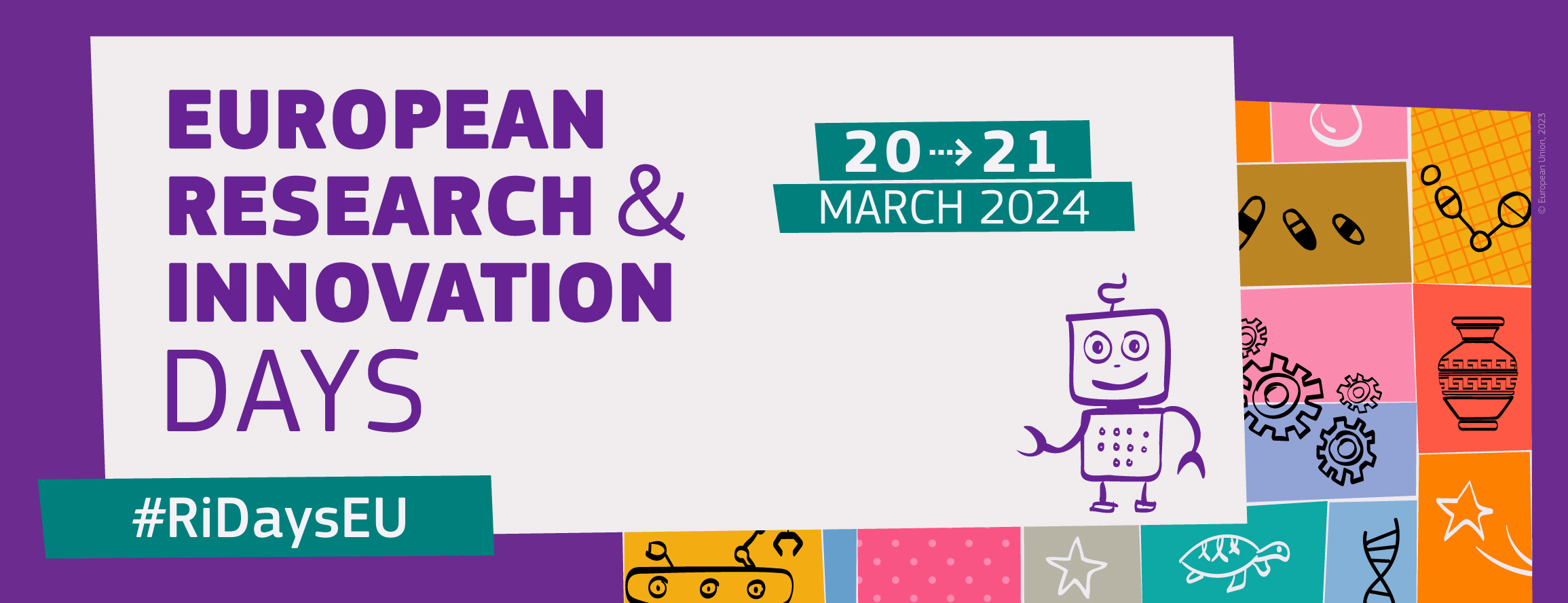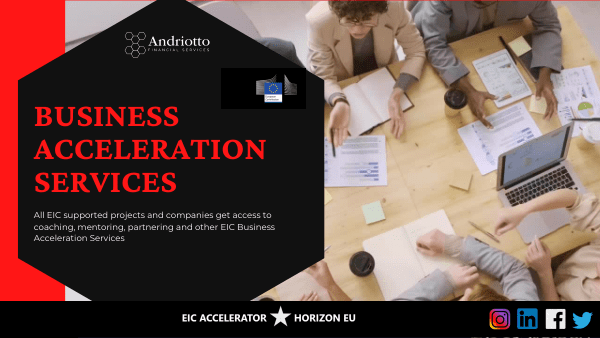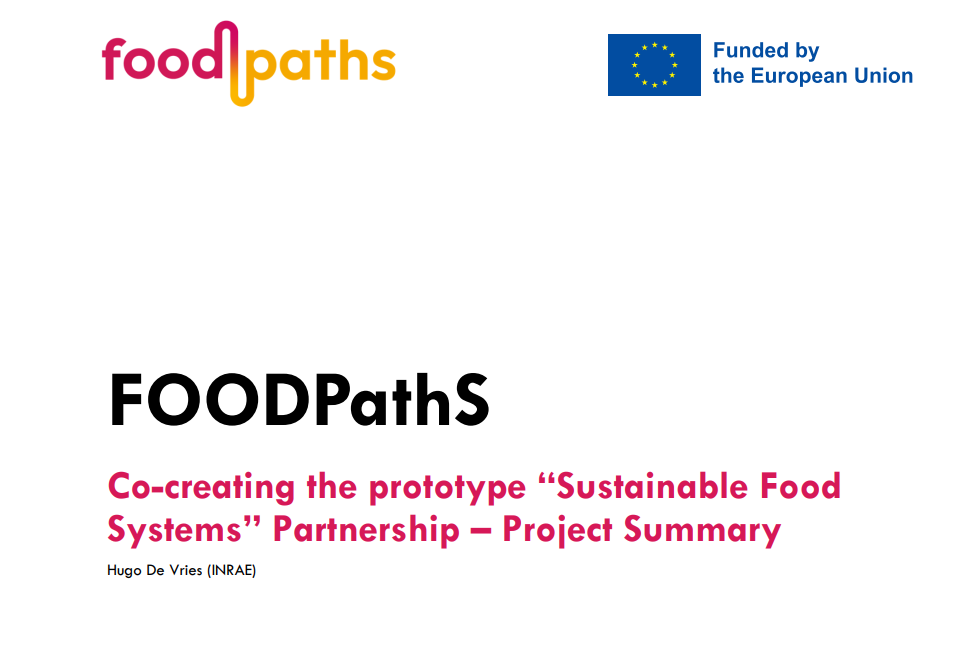18 - 21 March 2024. European Research and Innovation Days are part of the R&I Week
40-years journey through the Research and Innovation Framework Programmes. Check the programme here!
This fifth edition will take place during the Research and Innovation Week on 20 and 21 March 2024, both in Tour and Taxis (Brussels) and online, allowing everyone to get involved from anywhere.
Extracts of the programme
18/03 Joint opening of R&I week
- A 40-Year Journey Things you Didn’t Know About
- European R&I Celebrate the Past Prepare for the Future
- Europe: A Scientific Powerhouse
- Tech Sovereignty Empowering European Companies to Shape the Future
- Beyond the Horizon Preparing for the Next Framework Programme
- Women Innovators
19/03 European innovation Council (EIC) Beneficiaries Day
This session presented the EIC Business Acceleration Service. How can the EIC Business Acceleration Services help access Corporates, Investors, Innovation Procurers, and connect with accelerators, incubators, venture builders or business partners at International Trade Fairs.
Scaling up in Europe and beyond - Web streamed
The EIC and its ecosystem are putting at the disposal of EIC awardees high-quality tools to support their journey for growth. In this session, the attendees got to know firsthand on those tools and the latest trends for scaling up at European and global level. The session’s international speakers and moderator shared their large practical experience in supporting deep tech companies and their passion about driving innovation and societal impact into the business world. This session offered an opportunity to learn about best business practices and EIC activities that can shape the future of many EIC companies.
EIC portfolio management: generating impact - Web streamed
Proactive portfolio management is one of the main priorities of the EIC Programme Managers. In this session, three Programme Managers detailed what proactive portfolio management means and how the Programme Managers can generate impact for the portfolio projects. They explained how support beyond grant mechanisms looks like, how they supported projects in regulatory aspects and how the collaboration of portfolio projects generates added value.
20/03 R&I for Europe’s competitive sustainability
20/03 Boosting R&I investments and reforms to sustain long-term competitiveness in Europe
20/03 The AU-EU Innovation Agenda A Forward-looking Cooperation for the Africa-Europe Partnership - Web streamed
The session considered, as a ‘case in point’, the joint AU-EU Innovation Agenda
- The AU-EU Innovation Agenda represents the new policy mainstay of the R&I cooperation between Africa and Europe, conceived in a very collaborative fashion over the past three years, under the aegis of the AU-EU High-Level Policy Dialogue on Science, Technology and Innovation.
- Happening eight months after the adoption of this Agenda, this session provided an opportunity to take stock of the progress of the implementation of the AU-EU Innovation Agenda and to present the launch of the new Dashboard of Initiatives contributing to the implementation of the AU-EU Innovation Agenda.
- At the same time, on the occasion of the 40 year-anniversary of the Framework Programme, the session also hosted two success stories to illustrate the current and future impact of the AU-EU Innovation Agenda.
Related link: EU-Africa cooperation in research and innovation



Director | European Commission

Commissioner | African Union
AUDA - NEPAD

Director Africa Directorate DG INTPA
| European Commission
20/03 Evolution of Association of Third Countries to EU Research & Innovation Framework Programmes - Web streamed
This session focused on the impact and benefits for the EU and for specific third countries of the association of third countries to the Framework Programmes.
- International openness has reached an unprecedented level in Horizon Europe. For the first time, the programme has opened the association possibility to highly competitive R&I actors located also beyond the neighbourhood of the European Union.
- The panellists portrayed testimonials from third countries associated for many years, across several Framework Programmes, from ‘newcomers’ to the Programme, as well as the special case of working with the UK, previously an EU Member State, now returning to the programme as an Associated Country.
- The panellists reflected in their introductions on the value of their association to the Programme, main benefits involved and the impact it may have on their national R&I ecosystem, socio-economic development, and broader international cooperation relations with the EU.

President | TUBITAK



Ambassador | Embassy of New Zealand to EU and NATO

Assistant Deputy Minister | Department of Innovation, Science and Economic Development, Canada
20/03 Artificial Intelligence for Scientific Discovery
Given the rapid advancement of AI technologies and their increasing integration into scientific fields, this discussion anticipated how AI will support scientific breakthroughs in the next decade. The speakers provided their views in relation to the most promising avenues in which AI can transform science and they should sketch the role of EU policy to support and accelerate this process in the EU.
Executive Vice President of the European Commission | European Commission

Professor | University of Manchester

Vice President of research | Deepmind-Google

President | Adra
21/03 Innovation Ecosystems for Bioeconomy and Food Systems
This session presented the importance of innovation ecosystems in Europe with a particular focus on the “Regional Innovation Valleys for Bioeconomy and Food Systems”, one of the DG RTD initiatives supporting the deployment of NEIA, the New European Innovation Agenda published in 2022 by the European Commission.
“Regional Innovation Valleys for Bioeconomy and Food Systems” can have a significant potential to support and accelerate the deployment of the bioeconomy and food systems transformation in regions addressing the innovation divide within the EU.The session addressed also how EIT Food programmes are becoming more fundamental in managing an agri-food pan European innovation ecosystem to accelerate the transition to sustainable and resilient food systems.


Deputy DIrector General | European Commission

Director of the Agroecological Centre | Agricultural University of Plovdiv

Chief Executive Officer | EIT Food
21/03 The Power of Knowledge Valorisation
This session highlighted the essential role of knowledge valorisation to deliver interdisciplinary innovative solutions for complex global challenges while ensuring European industrial competitiveness in a resilient, sustainable, responsible and human-centric way.
Speakers provided their insights in the context of the recently adopted Commission Recommendations on the Codes of practice on industry-academia co-creation and on citizen engagement for knowledge valorisation and how it strengthens the uptake of results by enabling and facilitating co-creation and collaboration between all stakeholders in all domains of the R&I ecosystem.
- EC/DG RI (2024) Valorisation policies – Code of practice on industry-academia co-creation – Commission recommendation, Publications Office of the European Union # 2p.
The Code of Practice on industry-academia provides practical guidance for creating successful partnerships for knowledge valorisation. It calls for promoting co-creation in the organisation’s strategy, investing in skills, networking, communication, and awareness raising. It stresses the importance of creating incentives and strengthening the role of intermediaries and joint infrastructures in translating research results into business applications. - EC/DG RI (2024) Valorisation policies – Code of practice on citizen engagement – Commissionrecommendation, Publications Office of the European Union, # 2p.
The Code of Practice on citizen engagement offers practical guidance to strengthen links between research entities and societal actors for better uptake of research results. It identifies the need for a strategic approach at the organisation level which encourage cross-sector collaboration, awareness raising and strengthening the role of intermediaries. It also proposes the use of incentives, co-creation tools and digital solutions with a human-centric and sustainable design.

CEO | ROSI

President of the Board of Directors | Agência Nacional de Inovação (ANI)

Deputy DIrector General | European Commission
New publications:
EC (2024) Building the future with nature: Boosting Biotechnology and Biomanufacturing in theEU #21 p.
The Commission has proposed a series of targeted actions to boost biotechnology and biomanufacturing in the EU. The Communication on Building the future with nature identifies the challenges and barriers and proposes to tackle them, in line with the Communication on the long-term competitiveness of the EU. The advances in life sciences, supported by digitalisation and artificial intelligence (AI), and the potential of solutions based on biology to solve societal issues, make biotechnology and biomanufacturing one of the most promising technological areas of this century. They can help the EU to modernise its agriculture, forestry, energy, food and feed sectors and industry. In addition, these technologies can contribute to a more competitive and resilient EU, that provides better healthcare to its citizens, and succeeds in its green and digital transitions. Find more online.
EC (2024) Transition pathway for the agri-food industrial ecosystem #63 p.
The agri-food ecosystem is one of the 14 key industrial ecosystems identified in the EU's Industrial Strategy. This strategy announced the co-creation of transition pathways with stakeholders to help accelerate the green and digital transition. This collaborative effort aims to build on existing strategies and enable their implementation by providing concrete actions. These actions aim to reinforce commitments by relevant actors towards the sustainability, digitalisation and resilience of the ecosystem.EC/DG RI (2024) Food 2030: Green and resilient food systems - conference outcome report #45 p.
In December 2023, over 400 people from the Food 2030 community convened in Brussels to attend the high-level conference “Food 2030: Green and resilient food systems”, and over a thousand more followed it online. See PAEPARD blogpost Food 2030: Green and resilient food systems - conference
The event, which represented an important milestone in the Food 2030 process, served to showcase promising Research and Innovation (R&I) outcomes contributing to sustainable food systems transformation in Europe and beyond. Furthermore, the conference provided a space for multi-stakeholder reflection and dialogue towards envisioning future R&I needs. The conference constituted of 14 panel sessions, 4 keynote speeches, 4 high-level addresses, for a total of over 60 speakers.
Extract of the report (page 30)Hugo de Vries Research Director at INRAE and coordinator of the EU funded project ‘FOODPathS’ that is preparing the EU Sustainable Food Systems (SFS) partnership, shared his expertise and pivotal role in building up the Partnership, shedding light on the development of the international dimension of this critical collaboration.Irene Annor-Frempong (FARA) Lead for the AU-EU FNSSA International Research Consortium, discussed the forthcoming AU-EU International Research Consortium (IRC) platform for FNSSA, highlighting the importance of international collaboration in addressing global challenges. The IRC knowledge platform on AU-EU collaborations presents structural, practical, and participatory interaction between partners to promote joint funding opportunities on priority FNSSA topics and improve the contribution of projects to European and Africa development goals as well as to global targets e.g., SDGs.
New Horizon Europe Partnership on Sustainable Food Systems
The Horizon Europe Partnership on Sustainable Food Systems for People, Planet & Climate is expected to launch soon this summer! Curious to learn more? Check out the webpage of the EU-funded project “FoodPathS”, a preparatory action that aims to offer a concrete pathway and necessary tools for establishing an appropriate operational environment for the future Partnership.Are you a policymaker, a researcher, an NGO representative or a citizen? Discover how you can get engaged and what are resources and tools designed for you by FOODPathS!





No comments:
Post a Comment